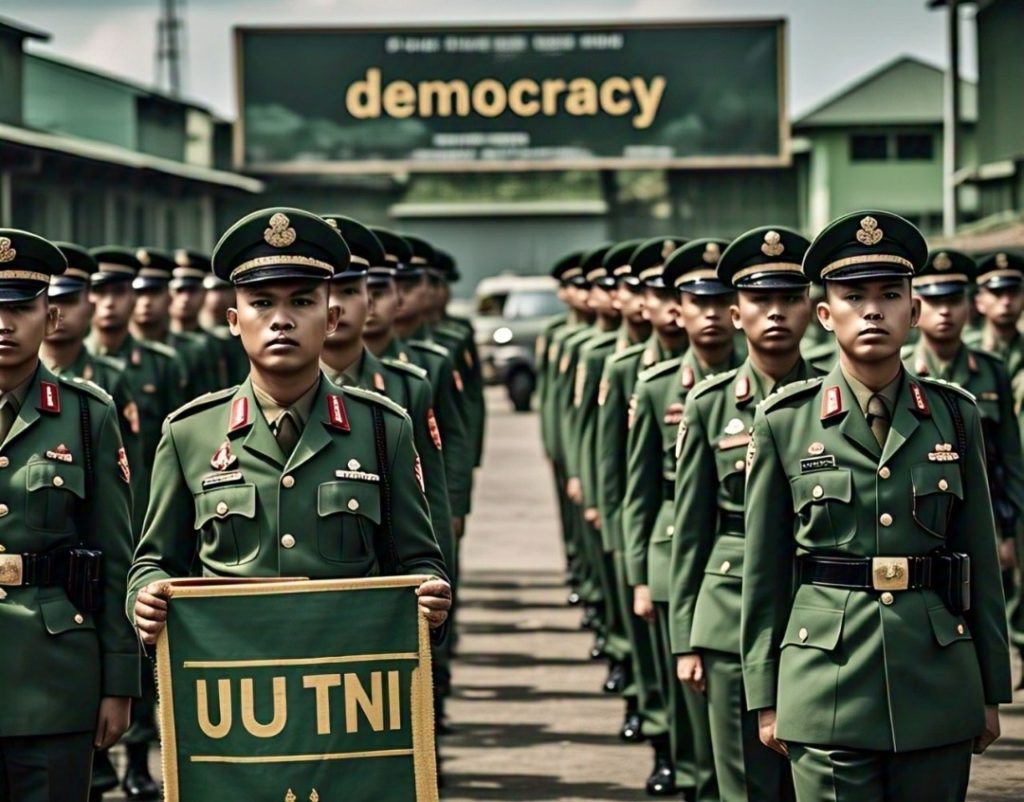Democracy, ultimately, is nothing more than an effort to approach an ideal.

Illustration: TNI Law and Democracy (Netralnews/Meta AI)
From the very beginning, democracy has always been viewed as a noble aspiration — an ideal system believed to guarantee freedom, equality, and public participation in shaping the course of a nation. Yet, the long history of humankind has taught us that a truly perfect democracy has never existed. Democracy, in the end, is merely an effort to approximate an ideal, not a flawless condition. There is always tension between the spirit of idealism and the political realities filled with compromise and vested interests.
Thus, crises in democracy are not an aberration, but rather an integral part of its journey. Since ancient Greece, philosophers had already expressed doubts about democracy. Socrates warned that a state is like a ship that cannot be entrusted to all its passengers, but must be steered by a captain who understands the sea. Plato went further, arguing that democracy is nothing more than a path toward tyranny, as unlimited freedom leaves people easily deceived by politicians. Aristotle then proposed a middle ground through polity, a mixture of democracy and oligarchy that prioritizes the common good.
When applied to Indonesia, all these criticisms feel tangible. Parliamentary democracy produced unstable cabinets, Guided Democracy led us into authoritarianism, Pancasila Democracy legitimized the New Order’s hegemony, and post-reform procedural democracy fell into oligarchy and transactional politics. In short, democracy has never been ideal — and in Indonesia, the various models attempted have all failed to deliver justice and prosperity for the people.
British Prime Minister Winston Churchill captured it well: “Democracy is the worst form of government, except for all the others that have been tried.”
Civil–Military Relations in Indonesia
The history of civil–military relations in Indonesia traces back to the independence struggle, when the military was born out of the people’s fight against colonialism. From that experience grew a belief within the armed forces that they had played a pivotal role in establishing the Republic — and therefore had the right to help govern the nation. This is why they named themselves the Indonesian National Armed Forces (TNI), not “Armed Forces” — a deliberate assertion that they are part of the people, not a power above them.
This historical consciousness later gave rise to the “dual function” (dwifungsi) ABRI doctrine, which legitimized military involvement in political, economic, and social affairs. The problem, however, lies in the rationale of “from the people, for the people.” If used again as justification for re-entering the civilian sphere, democracy risks regressing, as the state may once again be run by command logic rather than deliberation and consensus.
The 1998 Reform Movement sought to end this dominance by restoring the military to its core duties. The dwifungsi doctrine was abolished, and the defense institutions were separated into TNI and the National Police. The TNI was tasked with defense and state security, while the police were given authority over public order and safety.
Yet these changes did not automatically resolve the issue. A new phenomenon emerged — competition between institutions, even spilling into electoral politics. A political party born from within the police was established, cynically dubbed “Parcok” (Partai Coklat), or Brown Party. This reflects that the tug-of-war over political roles between civilians, the military, and the police continues, albeit in new forms.
Recently, we have once again begun to witness echoes of the past: the TNI showing signs of re-entering the realm of governance. Proposals for active soldiers to hold civilian posts, the placement of officers in the bureaucracy, and political rhetoric from certain military elites all recall the dwifungsi era. This could be interpreted as a struggle for influence between TNI and the police, or more broadly, as the TNI’s desire to reclaim its dual role of the past.
This poses a serious challenge for Indonesia’s democracy, as fragile civilian supremacy now faces a military that still carries the historical memory of being both the nation’s savior and its ruler.
Between Objective and Subjective Control
Samuel Huntington distinguished between objective control, in which a professional military submits to civilian authority, and subjective control, in which the military becomes a political instrument of the ruling regime. Indonesia has experienced both. Under the New Order, the military held overwhelming political dominance. After Reformasi, though its role was reduced, the tug-of-war between civilian and military influence persisted, owing to weak civilian supremacy.
Meanwhile, advanced nations have proven that a healthy democracy can only be born from strong civilian supremacy. Indonesia faces a steeper challenge: its long history of military involvement, fragile civilian institutions, and a public prone to apathy do not provide an easy path toward a resilient democracy. Civil–military relations here are, in essence, a test of the nation’s political endurance.
The Dilemma of Civilian Supremacy in Indonesia
One of democracy’s core principles is civilian supremacy — that the military must submit to political authorities chosen by the people. In Indonesia, this principle has formally been in place since the 1998 Reformasi, with the abolition of dwifungsi ABRI and the separation of TNI and the Police. But the military’s long history of political involvement has made the reality on the ground far more complex.
Soldiers born from the people, and who feel deeply credited with independence, often find it difficult to fully submit to civilian elites they see as weak, corrupt, or sometimes incompetent. At the same time, Reformasi introduced a paradox: TNI soldiers were stripped of their political rights, barred from voting in elections that decide the very civilian government they must serve under. From the military’s perspective, this creates a psychological gap — how can they be expected to fully obey a civilian authority in which they had no say?
This sentiment fuels the temptation to return to the political stage, compounded by the civilian institutions’ recurring failure to deliver clean and effective leadership.
This phenomenon is not unique to Indonesia. Turkey has endured repeated coups, Egypt remains under military control after revolution, and Myanmar has openly reverted to military junta rule. These examples show how fragile civilian supremacy can be in nations where the military has historically played the role of “savior of the nation.” Indonesia faces a similar dilemma: civilian supremacy is acknowledged in principle, yet remains fragile in substance.
If civilian elites continue to fail at reform, it is not impossible that the military will once again invoke the mantra “from the people, for the people” to justify re-entering politics, dragging our democracy backward.
As Winston Churchill once said, democracy may be the worst system of government — except for all the others. So long as governance under civilian authority is carried out properly, free from corruption and dedicated to the people’s welfare, civil–military relations will never become a fundamental problem.
References
- Aristotle. (1998). Politics (C. D. C. Reeve, Trans.). Hackett Publishing.
- Crouch, H. (2010). Political Reform in Indonesia After Soeharto. Institute of Southeast Asian Studies.
- Feith, H. (2006). The Decline of Constitutional Democracy in Indonesia. Equinox Publishing.
- Huntington, S. P. (1957). The Soldier and the State: The Theory and Politics of Civil-Military Relations. Harvard University Press.
- Lev, D. S. (2009). Legal Evolution and Political Authority in Indonesia: Selected Essays. KPG (Kepustakaan Populer Gramedia).
- Plato. (2000). The Republic (T. Griffith, Trans.). Cambridge University Press.
- Stepan, A. (1988). Rethinking Military Politics: Brazil and the Southern Cone. Princeton University Press.
- Sundhaussen, U. (1982). The Road to Power: Indonesian Military Politics, 1945–1967. Oxford University Press.
- Varshney, A. (2000). Why Democracy Survives. Journal of Democracy, 9(2), 36–50.
- Zakaria, F. (2007). The Future of Freedom: Illiberal Democracy at Home and Abroad. W. W. Norton & Company.*
Chappy Hakim is a former Air Force chief of staff, the founder and chairman of the Indonesia Center for Air Power Studies (ICAPS), and a member of Kiroyan Partners’ Senior Advisory Council. The views expressed are personal.
Source: Netralnews.com, September 14, 2025.
Download the clipping here.



